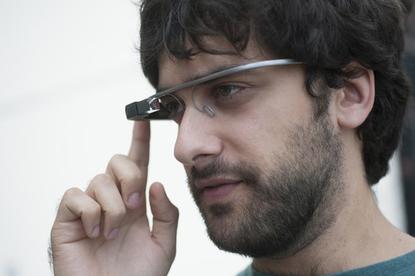Firms should use their staff as wearables guinea pigs, says Forrester
- 17 June, 2014 23:10

Companies that want to engage customers with wearables, but are worried about privacy issues, should run pilots with their employees first, a Forrester analyst has said.
Highlighting the success Virgin Atlantic has had with its Upper Class Wing Google Glasses pilot in Heathrow Terminal Three, Forrester analyst, JP Gownder, advised that arming customer-facing employees with wearables is the first step enterprises should be taking.
Virgin Atlantic's pilot saw business club lounge staff in Heathrow wearing devices to assist members with flight connection information, destination weather forecasts and restaurant suggestions.
Gownder said: "They have reported that it is been very successful and customers felt they were getting better customer service, more info and more attention. I would think they are going to roll this out, slowly, with the employees first."
The Forrester analyst said that wearables are fast becoming a reality in the workplace, especially with the arrival of Salesforce Wear on 10 June - a bundle of free tools and reference applications. The devices will come with open-source reference application to help developers design and build applications that connect to the Salesforce1 platform.
But with many enterprises concerned about warding off consumers with privacy fears, employee pilots will help to learn more about where concerns are, and how they can be alleviated, in a controlled way. Employee feedback will help develop customer-facing applications, Gownder said.
"A lot of B2B2C scenarios have thorny privacy issues. If you give it [wearable device] to your employees you have some privacy risks - but you have capability to calibrate, educate and learn before taking it to consumer market," he added.
For customer-facing businesses like banks, retailers, hospitals and insurance providers, Gownder warned that extra care must be taken when employees are wearing devices that are collecting personal information.
Related: How wearable computing could change the face of marketing
"With the example of Virgin Atlantic, in that sense customers have already opted in to the experience of the first class lounge and have already authenticated. But someone who walks into your shop has not authenticated you to know their personal details. The target market of wealthy, frequent travellers who tend toward the tech savvy are different from the general Virgin Atlantic kiosk in Heathrow," he said.
Wearables after mobility
Replicating successful customer engagement through mobility case studies will also help increase trust in wearables that collect data, Gownder said.
He gave the example of international convenience shop 7-Eleven, which enjoyed over one million mobile application downloads in the past nine months. By offering location enabled discounts when a customer was in close proximity, without the user having to enter personal details, 7-Eleven built up trust, Gownder said. When users saw that they could get even better discounts by handing over information, they were happy to sign up.
"They [7-Eleven] built a bridge that did not make people feel like they had to necessarily give away their personal information too much. Plenty of people started opting in after using it for a short time," he said.
Unlocking the potential to gain consumer insight from wearables is in enterprises' hands, Gownder insisted, but companies need to take a big bang approach, with low expectations but an assumption that "the consumer market is roaring forward, it [wearable devices] is going to disrupt our customers and we are going to go all in".
"By doing this transparently and treating people well you can help transform the landscape. There will be fewer privacy issues and better cultural acceptance."

